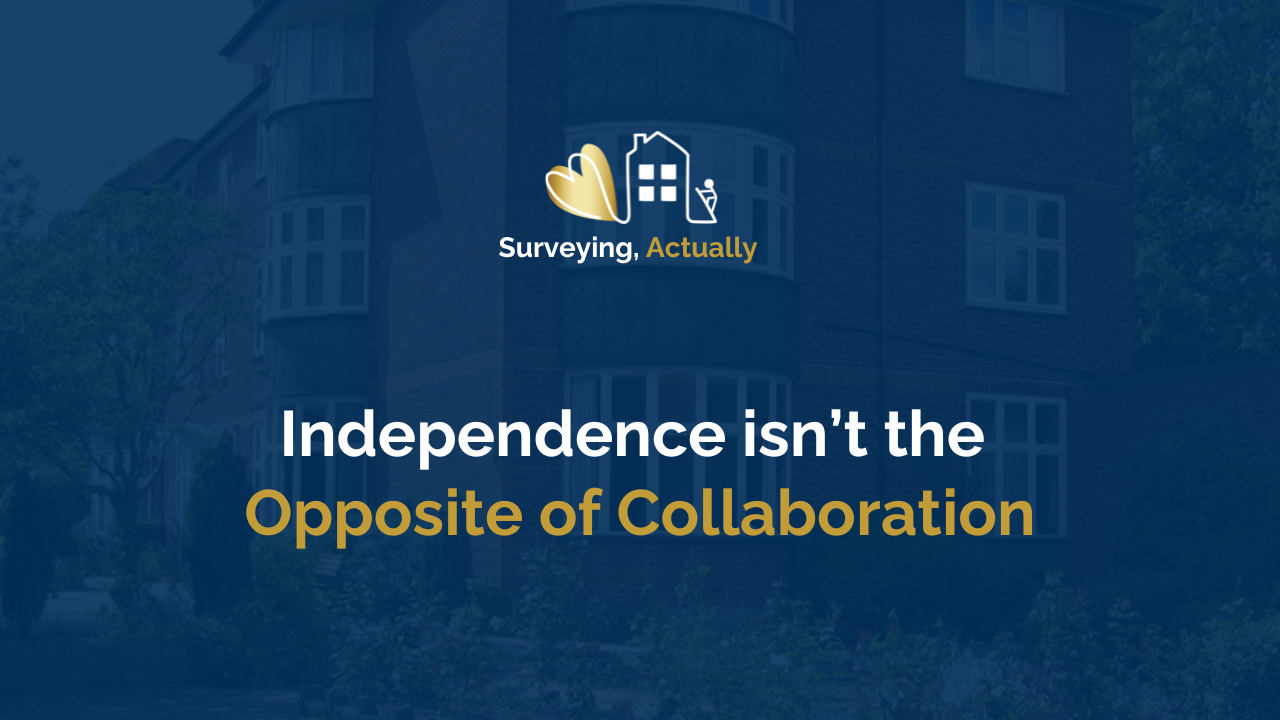Understanding Surveyor Complaints and Claims
Oct 25, 2023
Every smart surveying business owner, regulated by the RICS or not, will have a complaints procedure ready to issue at the first sign of a claim. Some even have them on their website. A documented procedure has several benefits - it helps the client understand what will happen, offers reassurance and demonstrates that their concerns will be taken seriously in the event of escalation to a regulatory body or third-party redress provider such as CEDR.
If you are an RICS member, you can find all the relevant documents on complaints here.
Over the years, I have seen lots of helpful advice shared on how to handle complaints and claims. More recently, RICS shared this podcast, and although aimed at valuers, all surveyors would do well to listen to it.
The problem is that most of the shared advice and discussion skips right over the bit, where a surveyor picks up the phone or opens an email and has to digest the devastating news. And, even if the complaint is not serious or can be defended, a surveyor has to go through the motions, the worry, the fear and the anger before coming out the other end in a frazzled state, vowing never to find themselves in that kind of situation again.
I spent most of my career as a surveyor ‘handling’ everything from annoying post-valuation queries (PVQs) from lenders to multi-million-pound valuation and defects claims of all shapes and sizes and for firms large and small.
In addition to the more general complaint and claim handling discussions and articles you may come across, I’d like to share with you some of the things I have learned about what happens when you get a complaint or a claim. It, of course, also goes without saying, but I will, that you must speak to your legal adviser, broker and insurer to ensure the way you are managing your complaint and claim process is in alignment with the PII policy and any regulatory requirements you may have. These are my reflections as information only, not advice.
You will discover how 'helpful' your Broker really is
Brokers are not there to find you a ‘great’ deal on your professional indemnity insurance financially; they are also there to ensure you have the support you need when things go wrong, but they are often far from hand-holding. It’s vital you know what happens when a complaint comes in - under what circumstances you refer matters to your insurer, what you are expected to do and crucially, what the insurer will do and in what time scale. If they can’t give you clear guidance and certainty, they are unlikely to do so when you really need it.
Triage can make all the difference
When a complaint comes in, as hard as it is, you need to understand the scale of the problem, a bit like triage in a medical centre or hospital. Gather the facts and prioritise the worst-case scenario; what information do you need to understand the problem better? That means rather than just focusing on one issue or incident; you look at the whole property, your inspection and reporting, and the customer journey from the first point of contact and every touch point afterwards. Lifting the lid may feel painful and take a bit more time. But it means that ultimately, you are more likely to resolve all issues in one hit, and any compensation offered is in full and final settlement. Nothing is worse than clients returning with 'another thing’ they are concerned about.
Importantly, this approach also allows you to understand the client's emotional state behind their complaint - often, contacting the surveyor is the final straw. Understanding this can help you find a solution that works for everyone and how you handle it.
If you reinspect, include an assessment of the effect any defect has on the property's value, as this can help you work out if there has been any loss. And if you don’t know, get help from a knowledgeable person. Understanding what you are dealing with and what you think needs to be done to resolve the matter can make a more positive and constructive conversation with your insurer.
The complaint procedure is only part of the story
You also need a description of the procedure, which sets out what happens in the event of a claim for everyone in the business, who has ownership and what they are responsible for. You will also need a central log where you can record all of the details.
As a surveying business, you need consistency and certainty that everyone involved is playing their part and doing what they need to do to resolve the situation quickly - time isn’t just money; it also affects our mental and physical health, how frustrated everyone involved feels and ultimately your reputation for clients and if you are looking to recruit surveyors in the future.
It is a complaint until it is a claim
Everything that happens before completion is usually called a complaint (sometimes a pre-completion complaint); no matter how embarrassing, it can and must be resolved before contracts are exchanged. You must issue your complaints procedure in the same way. Still, pre-completion complaints are often resolved more quickly, in a more personable manner and through goodwill payments, offering the opportunity for a report to be withdrawn and therefore not relied upon.
Any matter raised after legal completion has the potential to become a claim. You need to inform your insurer of situations that could become a future claim (known as a circumstance) if a complaint is raised post-completion or if you receive notification of a claim via a client's lawyer. Either way, costs are likely to be more significant, not least because you will need legal advice, and your insurance premium will be impacted.
But, even in a claim situation, with everything in writing and not admitting liability, you can still speak to your client as one human being to another. It is okay to say, ‘I’m sorry this has happened to you; I can see it has been a shock’, just as much as it is okay to say, ‘I’m disappointed you find yourself in this situation after using my service, let’s see if we can understand what has happened and what needs to be done to resolve the situation’.
Ask open questions to understand how the problem came about, acknowledge your client's fears and concerns and ask them what they think is needed to resolve the issue. Tell them you will work it out together if they don't know because that is actually what you are doing.
You can be kind and compassionate without overstepping any boundaries or admitting liability, and that is often the secret to clients feeling heard and valued because the truth is, that a client can leave you satisfied with how the matter was handled, even if they did not get the solution they were initially expecting.
Create commercial boundaries
Larger surveying firms will never admit that they budget a percentage of their annual income to cover the cost of complaints and claims. Some will issue a fee refund as a ‘gesture of goodwill’; others are self-insuring, with only the biggest of claims being passed over to loss adjusters who handle the matter on the insurer's behalf. That means they pay for all claims out of their own pocket.
It is inevitable in every business that something goes wrong, and just as you offer a discount to a client, you may want to issue a refund or goodwill payment for the little blips that sometimes happen. You have to weigh up the cost of your time to handle the situation and what it takes to close it down. There is nothing wrong with budgeting for future problems - it is a way of managing risk, and turning a disgruntled client into a happy one is money well spent. Decide your boundaries, and if necessary, discuss them with your Broker. Goodwill payments are not giving in to a client; it is sometimes just business and a way of managing risk.
You can be more helpful than you might initially feel
In the event of a claim, it is up to your client to prove you are in the wrong. As professionals, we know better than they do; it's why they came to us in the first place; eventually, though, as they get quotes and understand the situation better, they will work it out when they get other professionals involved. And then they get angry that not only was there a problem, but you didn't help them when they needed it and it becomes hard to be objective.
By triaging the situation at the start, you will better understand the problem and what action or investigation might be needed to resolve the situation. If they need quotes for works, be helpful, and explain the what, why, and how many (three usually). Tell them about the qualifications the experts or trades should have so they can find the right people and also the format which will be acceptable. While you may not be able to recommend someone in case it is a conflict of interest, you can direct them where to find reputable trades and professionals. Little things like this are just helpful and keep things moving.
Find a safe space to talk about it and get support
Although your Broker or Insurer will make clear that you shouldn’t be sharing any information about your business with anyone outside your business, you do need to talk about the experience with someone. Getting a serious complaint or a claim is like a punch in the gut, and only if you have had a similar experience will you really know what it feels like.
More than that, as surveyors, we have earned a professional reputation we are proud of, and we do care about our work, clients and employees. It is important you speak with someone to help gain some perspective, rebuild your confidence and put measures in place to learn from the experience. Just as the triage is vital at the start, so is a debrief so you can move forward with confidence.
I hope you found this article helpful; feel free to share it with your network, and if it feels right to do so, you can 'Buy me a Coffee' as thanks using the link below.
PS - You might also like to read Why Regulations Matter in your Surveying Business.





